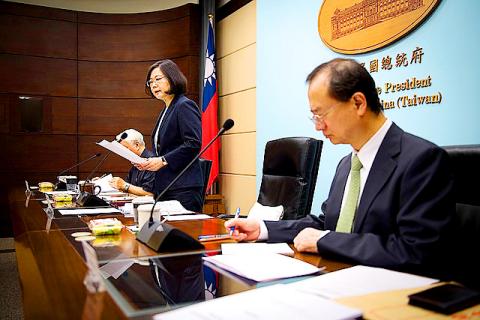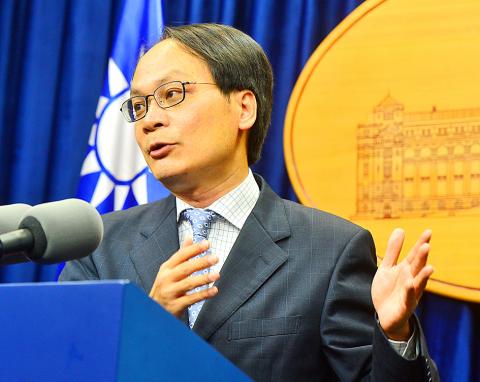President Tsai Ing-wen (蔡英文) yesterday outlined the key areas of focus for judicial reform, including increasing courtroom transparency, improving the selection and discipline of judges and prosecutors, bolstering judicial neutrality and professionalism, and establishing “trials with civic participation.”
Tsai made the comments at the sixth general meeting of the preparatory committee for the National Congress on Judicial Reform held at the Presidential Office, calling the items necessary to meet the public’s expectations.
“The courtroom must become more transparent by various means, including issuing verdicts that are comprehensible to the average person. The process for selecting competent judges and prosecutors and for weeding out incompetent ones must be improved. The professionalism and political neutrality of the judiciary must be bolstered. A system for civic participation in trials must be instituted,” Tsai said.

Photo courtesy of the Presidential Office
She also instructed agencies to make detailed proposals and set a clear timetable for their implementation.
The committee has worked hard over 40 sessions since November last year to create an agenda that comprises the most important items, Tsai said.
As legal reform must be based on popular support, the proposals must be described in comprehensible language, she said.

Photo: Wang Yi-song, Taipei Times
The reforms would be unsuccessful if they are not communicated to the public, regardless of their professional merits, Tsai said.
Civic participation in trials — which is largely supported by the public — is a priority, committee deputy executive secretary Lin Feng-jeng (林?正) told a news conference after the meeting.
The Judicial Yuan is drafting a trial system that is suitable for the nation and would make “citizen judges” a reality as soon as possible, he said.
Courtroom transparency is also to be improved by, for example, writing legal documents and reference books in modern, accessible Chinese, he said.
The training and selection of judges, prosecutors and lawyers would be streamlined by implementing a single bar examination instead of holding separate certification exams for each, Lin said.
Practical knowledge is to be emphasized in the education of judges and prosecutors, he added.
Other focuses include opening prosecutorial appointments and administrations to democratic oversight, making the court structure less top-heavy, establishing specialized courts for cases that require professional knowledge and procedural changes for the Council of Grand Justices, he said.
A stronger oversight system and ridding subpar officers is needed to restore public confidence, and review procedures should be made more effective, he said.
The committee is determined to protect the rights of the disadvantaged and has established several directives to do so, such as improving evidentiary laws, making recourse better available to the wrongfully convicted, creating protections for minors’ privacy and the rights of the disadvantaged, and implementing restorative justice, Lin said.
The committee is scheduled to hold a live-streamed general meeting at the Presidential Office on Aug. 12 to summarize its conclusions, and is to publish documents beforehand, he said.

MAKING WAVES: China’s maritime militia could become a nontraditional threat in war, clogging up shipping lanes to prevent US or Japanese intervention, a report said About 1,900 Chinese ships flying flags of convenience and fishing vessels that participated in China’s military exercises around Taiwan last month and in January have been listed for monitoring, Coast Guard Administration (CGA) Deputy Director-General Hsieh Ching-chin (謝慶欽) said yesterday. Following amendments to the Commercial Port Act (商港法) and the Law of Ships (船舶法) last month, the CGA can designate possible berthing areas or deny ports of call for vessels suspected of loitering around areas where undersea cables can be accessed, Oceans Affairs Council Minister Kuan Bi-ling (管碧玲) said. The list of suspected ships, originally 300, had risen to about 1,900 as

Japan’s strategic alliance with the US would collapse if Tokyo were to turn away from a conflict in Taiwan, Japanese Prime Minister Sanae Takaichi said yesterday, but distanced herself from previous comments that suggested a possible military response in such an event. Takaichi expressed her latest views on a nationally broadcast TV program late on Monday, where an opposition party leader criticized her for igniting tensions with China with the earlier remarks. Ties between Japan and China have sunk to the worst level in years after Takaichi said in November that a hypothetical Chinese attack on Taiwan could bring about a Japanese

Right-wing political scientist Laura Fernandez on Sunday won Costa Rica’s presidential election by a landslide, after promising to crack down on rising violence linked to the cocaine trade. Fernandez’s nearest rival, economist Alvaro Ramos, conceded defeat as results showed the ruling party far exceeding the threshold of 40 percent needed to avoid a runoff. With 94 percent of polling stations counted, the political heir of outgoing Costa Rican President Rodrigo Chaves had captured 48.3 percent of the vote compared with Ramos’ 33.4 percent, the Supreme Electoral Tribunal said. As soon as the first results were announced, members of Fernandez’s Sovereign People’s Party

MORE RESPONSIBILITY: Draftees would be expected to fight alongside professional soldiers, likely requiring the transformation of some training brigades into combat units The armed forces are to start incorporating new conscripts into combined arms brigades this year to enhance combat readiness, the Executive Yuan’s latest policy report said. The new policy would affect Taiwanese men entering the military for their compulsory service, which was extended to one year under reforms by then-president Tsai Ing-wen (蔡英文) in 2022. The conscripts would be trained to operate machine guns, uncrewed aerial vehicles, anti-tank guided missile launchers and Stinger air defense systems, the report said, adding that the basic training would be lengthened to eight weeks. After basic training, conscripts would be sorted into infantry battalions that would take